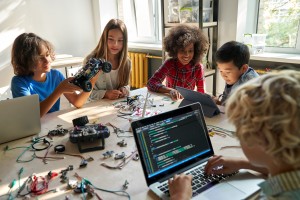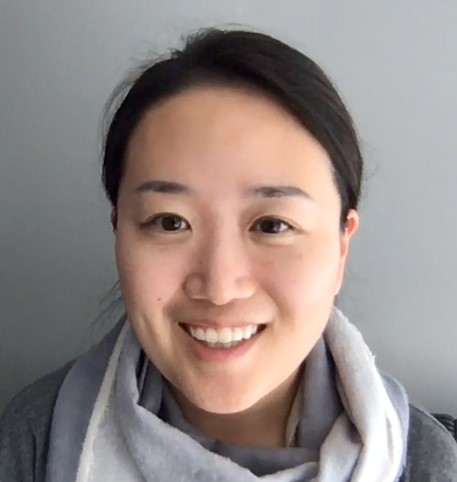The Future Workplace: Youth Learn to Work with AI
- Hee Rin Lee, Ph.D.
- Assistant Professor, Department of Media and Information
- College of Communication Arts and Sciences
Project Overview
- The project will engage youth from economically underserved communities with core knowledge about AI to codesign AI technologies for local industries in their communities.
- Activities will include understanding youth and how they conceptualize AI, developing AI literacy programs and materials, running the AI literacy programs in the three partner libraries, and developing and disseminating the findings and materials.
- The project will develop publicly available open-source AI education modules and webinars to build the capacity of library staff to run their own AI literacy programs.
Products/Outcomes
- Availability of AI literacy programs to youth in public libraries across the United States
- Increase of knowledge revolving around youth assets in underserved communities
Partners
- Kahyun Choi, Co-PI, Indiana University
- Courtney Tang, Capital Area District Library (CADL) – Lansing, MI
- Jill Abood, Capital Area District Library (CADL) – Lansing, MI
- San Diego Central Library (SDL) in San Diego, California
- Carroll County Public Library (CCPL) in New Windsor, Maryland
- Young Adult Library Services Association (YALSA)
- Mark Strolle (former employee), GM
- Preetham Suresh, UC San Diego Health Sciences
- Automated Protection Systems (APS)
Form(s) of Engagement
- Community-Engaged Research
- Community-Engaged Teaching and Learning: Non-formal

With libraries hosting AI literacy programs, underserved youth will learn about the fundamentals of AI and envision how AI can benefit local industries.
Human-robot interaction has long been an interest of Hee Rin Lee, assistant professor with the College of Communication Arts and Sciences at MSU. For Lee, the concept of positively combining human work with artificial intelligence (AI) through the use of robots, began while observing individuals in manufacturing plants. She found in these settings, robots have a high chance of replacing human workers, leaving production workers out of employment.
"Researchers in robotics are often intent on exploring the vast opportunities new technology can provide, but don't necessarily consider the potentiality of negative influences," Lee said. "My initial research focused on confronting detrimental consequences of new technologies on production workers."
Through her research, Lee found that production workers would have liked to learn more about the capabilities of AI sooner, to better prepare themselves for their future workplace. Having repeatedly witnessed how learning about AI would have benefitted these workers, she and her research team were inspired to propose an AI literacy program for youth in underserved communities.
Collaboration With Public Libraries
With her focus now on encouraging youth in underserved communities to take a hands-on approach to learning and accessing AI knowledge, she turned to exploring the role of libraries as community connectors.
"Public libraries have a great infrastructure in place in the United States. They are able to disseminate information regardless of a person's socioeconomic status or education level and have the potential to promote and nurture human-robot partnerships within their communities," Lee said.
Lee chose to collaborate with three public libraries in San Diego, California, New Windsor, Maryland, and Lansing, Michigan, each representing diverse populations in underserved areas.
"The three libraries we chose were located near underserved communities and had successfully led multiple youth Science, Technology, Engineering, Mathematics (STEM) programs, including Code Clubs, virtual reality programs, and robot education programs," Lee added.
From the project's inception, the Capital Area District Libraries (CADL) in Lansing, Michigan, has played a large role in recruiting students to take part in the program.
CADL Digital services specialist, Courtney Tang, commented on the library's involvement, saying, "We're working together to bring awareness of the project to teachers, parents, and other library staff who work closely with schools in the Lansing area. We're also providing readers' advisory to the Principal Investigators, and supplying them with relevant books and readings to support their development of project components."
Lee followed up, saying, "Based on demographics, and our library partners' experience with youth-focused programs, we worked together to co-develop AI literacy education materials taking an asset-based approach. We don't want to simply instill AI knowledge in the students, but rather understand what cultural and experiential knowledge they have, and help them connect new AI knowledge to their existing knowledge. By using this approach, students will see themselves as people with their own knowledge, and better position themselves to utilize this knowledge in their future workplace with new technologies."
AI Educational Materials: Learning Modules
Information garnered during an interview process will lead to the development of AI educational materials, outlined in two main modules. Both modules will include hands-on activities that allow student participants to be active-learners and co-designers. With Lee's intentions to localize the literacy programs, rather than generalizing them, local community issues will be incorporated into each library's individual curriculum.
The first module will work with ten student participants, ages 10-14, over the course of four days. They will learn about core AI, which focuses on how an AI system is trained, while also being encouraged to consider their own assets and how they can make positive impacts in a workplace.
At the end of the first module, students will develop their own AI prototypes using crafting materials and AI education platforms, like Google AI, which was designed to encourage individuals to explore how AI can address societal challenges.
Working with the same students, the second module will focus on the effects AI could have on local industries. Students in California will work with their local healthcare industry, students in Maryland will concentrate on local public safety industry, and students in Michigan will focus their research and work on the local manufacturing industry.
"When students enter the second module, we will have materials prepared to describe how AI can be utilized in local industries. We will show them pictures, videos, and recorded interviews with workers in their respective industries, while again, encouraging them to consider how their assets could assist AI systems in various workplaces," Lee said.
The second module will also include presentations by local industry-leaders, discussing the effects of AI in their workplace.

Hee Rin Lee, assistant professor in the College of Communication Arts and Sciences, is the principal investigator for AI literacy programs aimed at youth in underserved communities.
"As manufacturing is one of the largest industries in the United Sates, we're partnering with a manufacturing expert in Lansing who will come to CADL to discuss how AI has contributed to their work, and the benefits of humans and robots working together," Lee said.
Currently, Lee and her team are in the initial stages of the project, completing interviews with students to determine their assets and working knowledge of AI.
Tang stated CADL's future involvement will include hosting, assisting, and facilitating the programs.
Future of AI Literacy Programs
Following completion of the program, Lee and her research team plan to develop a website to share research, outcomes, notes, and guidelines with libraries interested in hosting their own AI literacy programs. Materials will include a summary of each session, main takeaways, lessons learned, exit interviews with students, and suggestions for future programs.
"Ultimately, we see this AI literacy program being disseminated in libraries across the U.S.," Lee said. "We think people from various backgrounds should have the option to learn about AI and have access to it, and we plan to support other libraries in the development of their own AI literacy programs."
The Young Adult Library Services Association (YALSA), an organization of libraries dedicated to developing and delivering resources to support teen learning and foster community work, plans to use their platform to help develop AI literacy webinars for librarians, promoting the program Lee and her team develop.
Locally, CADL and Tang are looking forward to seeing the impact the AI literacy program will make for Lansing-area youth. "Children can look forward to utilizing AI and other emerging technologies to improve their lives, communities, and society overall," said Tang. "Our work frequently revolves around education and learning on one hand, and supporting our community on the other, so this project feels like a natural expression of that. We're grateful to be able to participate and contribute."
- Written by Emily Springer, University Outreach and Engagement
- Photographs courtesy of Hee Rin Lee